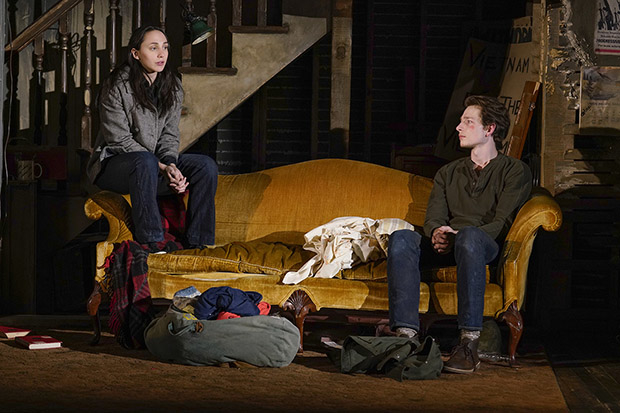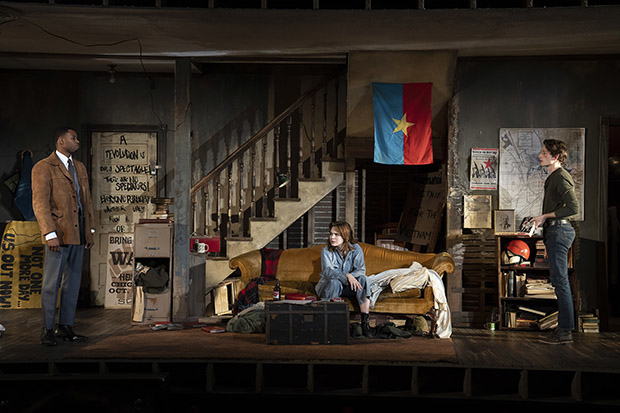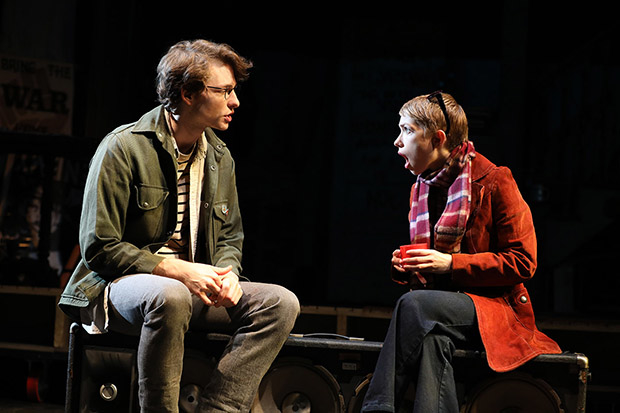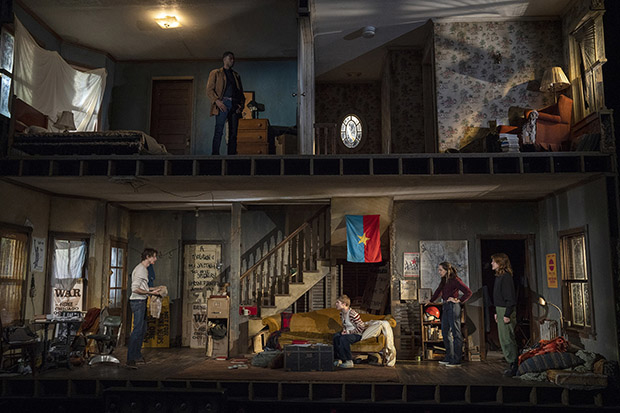The Spirit of 1969 Haunts America in Days of Rage
Steven Levenson’s latest play is about the young radicals of 50 years ago.

(© Joan Marcus)
When historians look back on the political legacy of the baby boom generation, they will likely note a focal shift away from class struggle and toward oppression based on more immutable forms of identity. This change has led to a greater awareness of injustices pertaining to race, sex, and sexual orientation — and boomer activists in these areas can rightly claim tangible victories. Steven Levenson's Days of Rage is not about them. Rather, it's about their cohorts who blasted into orbit around the Leninist fringe, perhaps out of a need to shore up their own fragile identities. This mildly funny satire of 1960s radicalism is now enjoying a lavish production directed by Trip Cullman at Second Stage Theatre. It's impressive to behold, but it all feels a bit too grand for the story being told.
It takes place in 1969 around a revolutionary "collective" formed by college dropouts Spence (Mike Faist) and Jenny (Lauren Patten). They were once an item, but in the communal spirit, they now share absolutely everything with the collective, which resides in a ramshackle house in Ithaca. Quinn (Odessa Young), who used to work in the university bookstore, is the only housemate from a working-class background. While two comrades have expropriated Jenny's car (which is really Jenny's parents' car) and absconded, a new one is eager to join: Peggy (Tavi Gevinson) is a runaway who can inexplicably contribute $2,000 to the group. It's money that could fund their entire trip to Chicago for the planned "Days of Rage" demonstration organized by the Weathermen faction of Students for a Democratic Society. Spence anticipates at least 25,000 radicals in the Windy City, setting the stage for a new Haymarket Riot.

(© Joan Marcus)
Students of history will know that it didn't quite turn out that way. This is, of course, a year after the chaotic 1968 Democratic convention in Chicago, during which student groups clashed with police and raised a Viet Cong flag (the same banner hanging on this set) over the statue of Civil War General John Logan. Americans saw this, and responded by electing Richard Nixon president. Levenson suggests important lessons in this story for the young activists of today.
Best known for writing the Tony-winning book of Dear Evan Hansen, but also for last season's terrific If I Forget, Levenson makes the parallels between then and now most blatant through the character of Hal (a sympathetic J. Alphonse Nicholson). He's a salesman at Sears who first meets Jenny when his boss sends him outside to ask her to leaflet somewhere else. A friendship develops, and Hal becomes an important reality check in Jenny's life, which the collective obviously cannot abide. A scene in which Spence refers to Hal's brother (who is serving in Vietnam) as "a black man being used by white men to kill yellow men," reveals the collective's real purpose, which is to scold while not actually changing anything. It's a realization that will feel familiar to anyone who has spent any amount of time on Twitter.

(© Joan Marcus)
And then there's Peggy: Gevinson gives a show-stealing performance as a young woman so desperate to belong that she'll say anything to signal her allegiance to the cause. "I hate white people," the very white girl says with painful sincerity during her first meeting with Spence. Like an escapee from the Mean Girls asylum, she attempts to stir up animosity between the two other women in order to solidify her place. While some may scoff at Gevinson's transparently false line delivery, it actually underlines how self-involved these characters are. The whole group whips itself into authentic hysteria, certain that they're being monitored by the FBI. The truth turns out to be far more mundane.
Not that we ever believe these kids are in danger. Cullman milks plenty of laughs from the script, but very little dramatic tension. He compensates with high production values: Louisa Thompson's massive two-tier set depicting the Communist frat house lurches downstage, creating an expensive modicum of intimacy for the interior scenes before retreating upstage again. This happens several times, and Darron L. West underscores these transitions with songs by contemporaneous bands like Thunderclap Newman, giving the stage the feeling of a '60s-themed diorama. An atmospheric final effect meant to punctuate the play adds little to the story, but it does look cool.

(© Joan Marcus)
Levenson concludes with the lazy playwright's epilogue, which is to have a character project far into the future and reveal how they turn out. Since they seem to follow life trajectories that vaguely correspond to their starting class positions, it makes us wonder if class is not also a mostly immutable trait in America — one that should be treated with the same seriousness as sex and race.
Overproduced and underwhelming, Days of Rage is an incredulous snort at boomer idealism from those of us who are living with the consequences 50 years later. It's also a self-consciously futile warning for today's young idealists, who aren't quite as revolutionary in their thinking as they'd like to believe.










